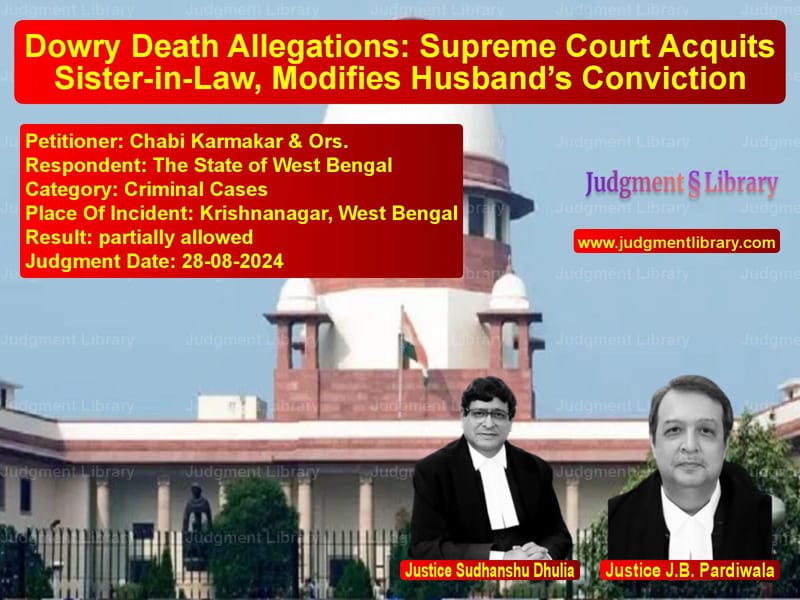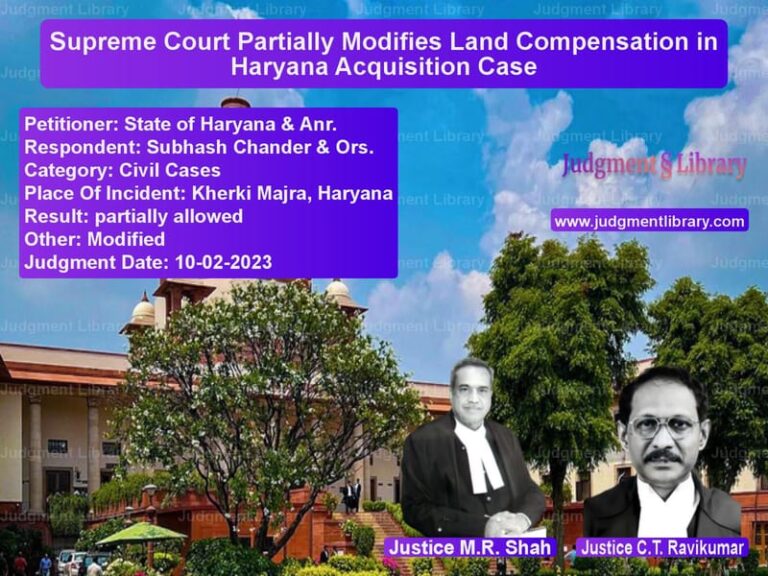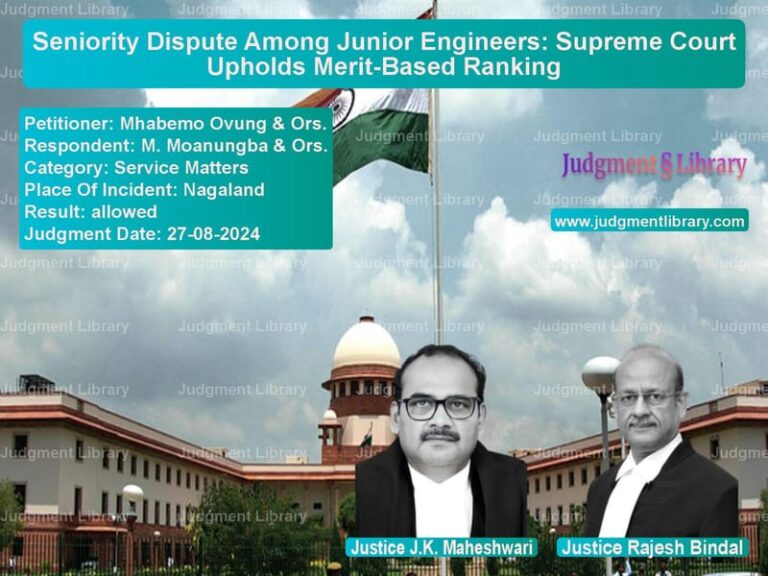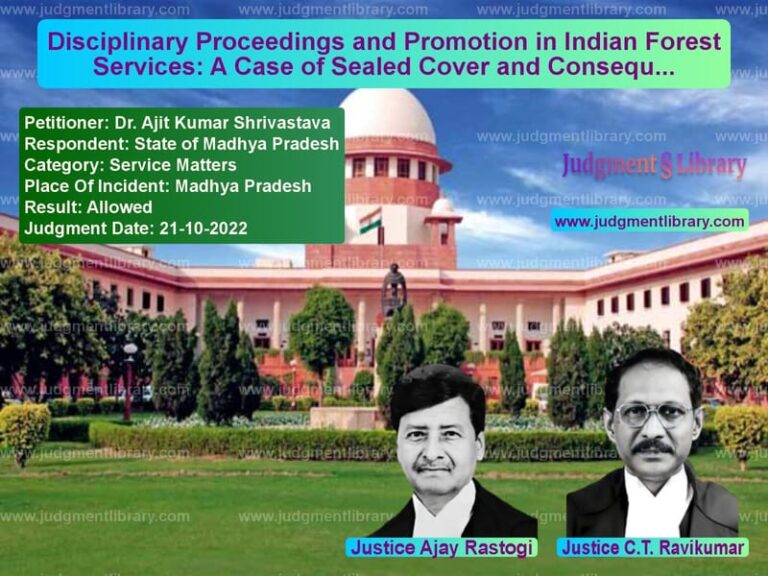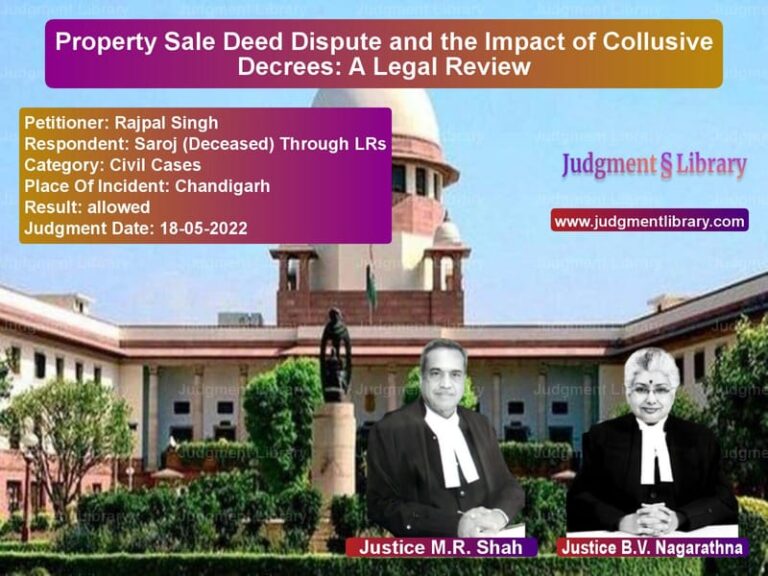Dowry Death Allegations: Supreme Court Acquits Sister-in-Law, Modifies Husband’s Conviction
The Supreme Court of India recently delivered its judgment in the case of Chabi Karmakar & Ors. vs. The State of West Bengal, a significant case concerning allegations of dowry harassment, abetment of suicide, and cruelty under the Indian Penal Code (IPC). This judgment sheds light on the legal interpretation of dowry-related offenses, evidentiary requirements, and the principle of justice in cases involving matrimonial disputes.
Background of the Case
The case arose from the tragic suicide of Sonali Karmakar on May 2, 2006, in her matrimonial home. She was married to Samir Karmakar (Appellant No. 2) in March 2003. According to the prosecution, Sonali faced harassment from her husband, mother-in-law, and sister-in-law due to dowry demands.
After Sonali’s death, an FIR was filed on May 7, 2006, by her brother, alleging that his sister was subjected to mental and physical cruelty for dowry. The case was investigated under Sections 498A, 304B, and 306 read with Section 34 of the IPC. The trial court convicted the accused and sentenced:
- Samir Karmakar (Husband) – Life imprisonment for dowry death (Section 304B), 3 years for cruelty (Section 498A), and 10 years for abetment of suicide (Section 306).
- Sova Rani Karmakar (Mother-in-law) – Convicted and sentenced, but she passed away during the appeal.
- Chabi Karmakar (Sister-in-law) – Convicted under Sections 304B, 498A, and 306.
The High Court upheld the conviction and dismissed the appeal. However, the accused then appealed to the Supreme Court, challenging the legal basis of their convictions.
Arguments by the Appellants
The defense put forward several arguments:
- The prosecution failed to establish a direct link between Sonali’s death and dowry demands.
- Chabi Karmakar (Appellant No. 1) lived in her matrimonial home and had no role in the alleged cruelty.
- The trial court wrongly applied the presumption under Section 113B of the Indian Evidence Act, which states that if a woman dies within seven years of marriage under suspicious circumstances, the husband and in-laws can be presumed guilty of dowry death unless proven otherwise.
- Sonali’s death was a suicide due to marital discord and not because of dowry harassment.
- There was insufficient evidence that Sonali was harassed specifically for dowry before her death.
Arguments by the State
The prosecution, representing the State of West Bengal, argued:
- Sonali was harassed and tortured by her in-laws, which eventually led her to commit suicide.
- Multiple witnesses, including her family members (PW-1, PW-3, and PW-16), testified that she was harassed for dowry.
- Samir Karmakar had an extramarital affair, which further aggravated the cruelty towards Sonali.
- The trial court was correct in invoking Section 304B IPC (dowry death) and Section 306 IPC (abetment of suicide).
Supreme Court’s Key Observations
After reviewing the evidence, the Supreme Court made the following critical observations:
- Sonali died within seven years of marriage, which fulfills one of the criteria under Section 304B IPC.
- There was no conclusive evidence that Sonali was harassed specifically for dowry immediately before her death.
- General allegations of cruelty do not automatically amount to a dowry-related offense.
- The trial court wrongly relied on Section 113B of the Evidence Act without sufficient proof.
- The sister-in-law (Chabi Karmakar) was wrongly convicted because she was not even living in the matrimonial home of the deceased.
Final Verdict
The Supreme Court partially allowed the appeal and modified the sentences:
- Chabi Karmakar (Sister-in-law) – Acquitted as there was no evidence against her.
- Samir Karmakar (Husband) – Conviction under Section 304B (dowry death) was set aside. However, he was convicted under:
- Section 498A (Cruelty) – 3 years rigorous imprisonment with a fine of ₹25,000.
- Section 306 (Abetment of suicide) – 3 years rigorous imprisonment with a fine of ₹25,000.
- The Supreme Court directed that the fine amount be paid to the nearest relative of the deceased within 3 months.
Legal Precedents Cited
The Supreme Court relied on past rulings:
- Charan Singh vs. State of Uttarakhand (2023) – Held that general cruelty does not amount to dowry harassment unless a clear link is established.
- Rajinder Singh vs. State of Punjab (2015) – Reinforced that presumption under Section 304B IPC cannot be applied in the absence of specific dowry demands.
- State of Madhya Pradesh vs. Jogendra (2022) – Explained that “soon before death” evidence must be strong and credible.
Implications of the Judgment
The Supreme Court’s ruling has significant implications:
- Clarifies burden of proof: The ruling reinforces that for dowry death charges, the prosecution must prove a direct link between the alleged cruelty and dowry demands.
- Prevents misuse of dowry laws: The acquittal of the sister-in-law sets a precedent that distant relatives cannot be implicated without strong evidence.
- Focus on mental cruelty: The conviction under Section 306 IPC highlights that even in the absence of dowry harassment, continuous cruelty by a spouse can still lead to criminal liability.
Conclusion
The Supreme Court’s verdict in this case serves as a significant milestone in clarifying the legal interpretation of dowry-related offenses. By acquitting the sister-in-law and modifying the husband’s conviction, the Court has reinforced the principle that criminal liability must be based on solid evidence, not mere presumption. The ruling upholds the delicate balance between protecting victims of domestic violence and preventing the misuse of dowry laws.
Read also: https://judgmentlibrary.com/money-laundering-case-supreme-court-grants-bail-in-pmla-investigation/
Petitioner Name: Chabi Karmakar & Ors..Respondent Name: The State of West Bengal.Judgment By: Justice Sudhanshu Dhulia, Justice J.B. Pardiwala.Place Of Incident: Krishnanagar, West Bengal.Judgment Date: 28-08-2024.
Don’t miss out on the full details! Download the complete judgment in PDF format below and gain valuable insights instantly!
Download Judgment: chabi-karmakar-&-ors-vs-the-state-of-west-be-supreme-court-of-india-judgment-dated-28-08-2024.pdf
Directly Download Judgment: Directly download this Judgment
See all petitions in Dowry Cases
See all petitions in Domestic Violence
See all petitions in Alimony and Maintenance
See all petitions in Suicide Cases
See all petitions in Judgment by Sudhanshu Dhulia
See all petitions in Judgment by J.B. Pardiwala
See all petitions in partially allowed
See all petitions in supreme court of India judgments August 2024
See all petitions in 2024 judgments
See all posts in Criminal Cases Category
See all allowed petitions in Criminal Cases Category
See all Dismissed petitions in Criminal Cases Category
See all partially allowed petitions in Criminal Cases Category

